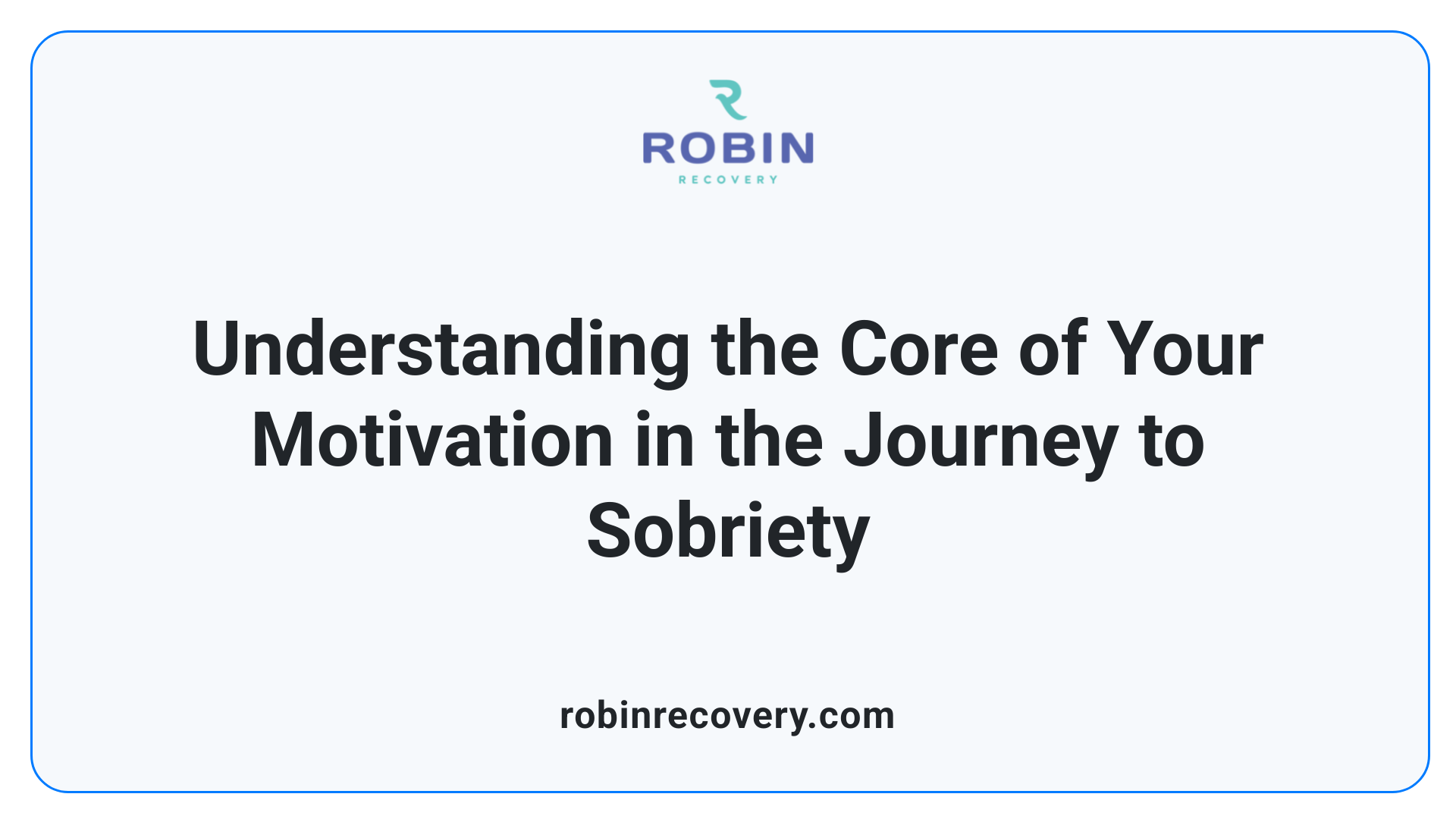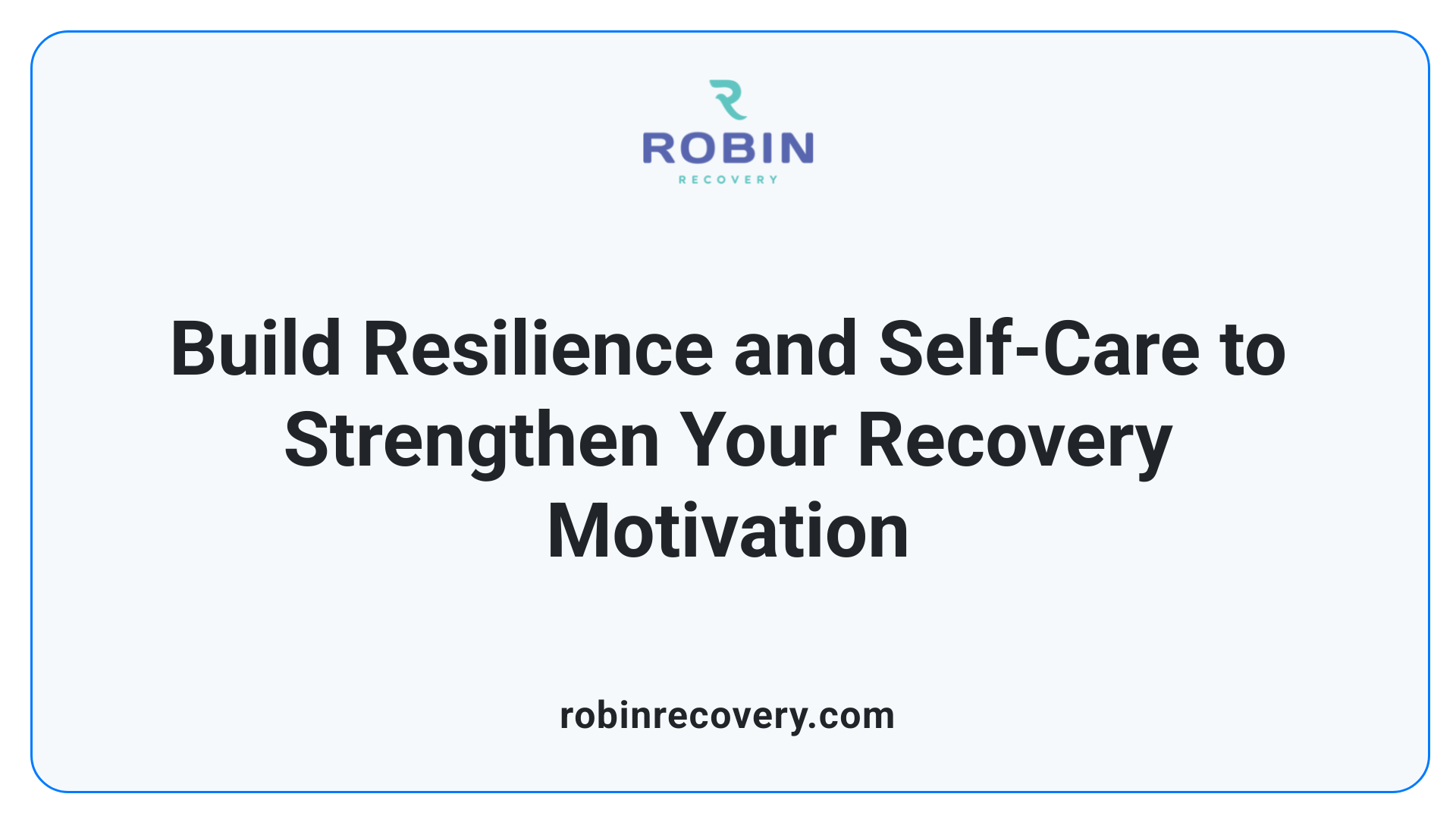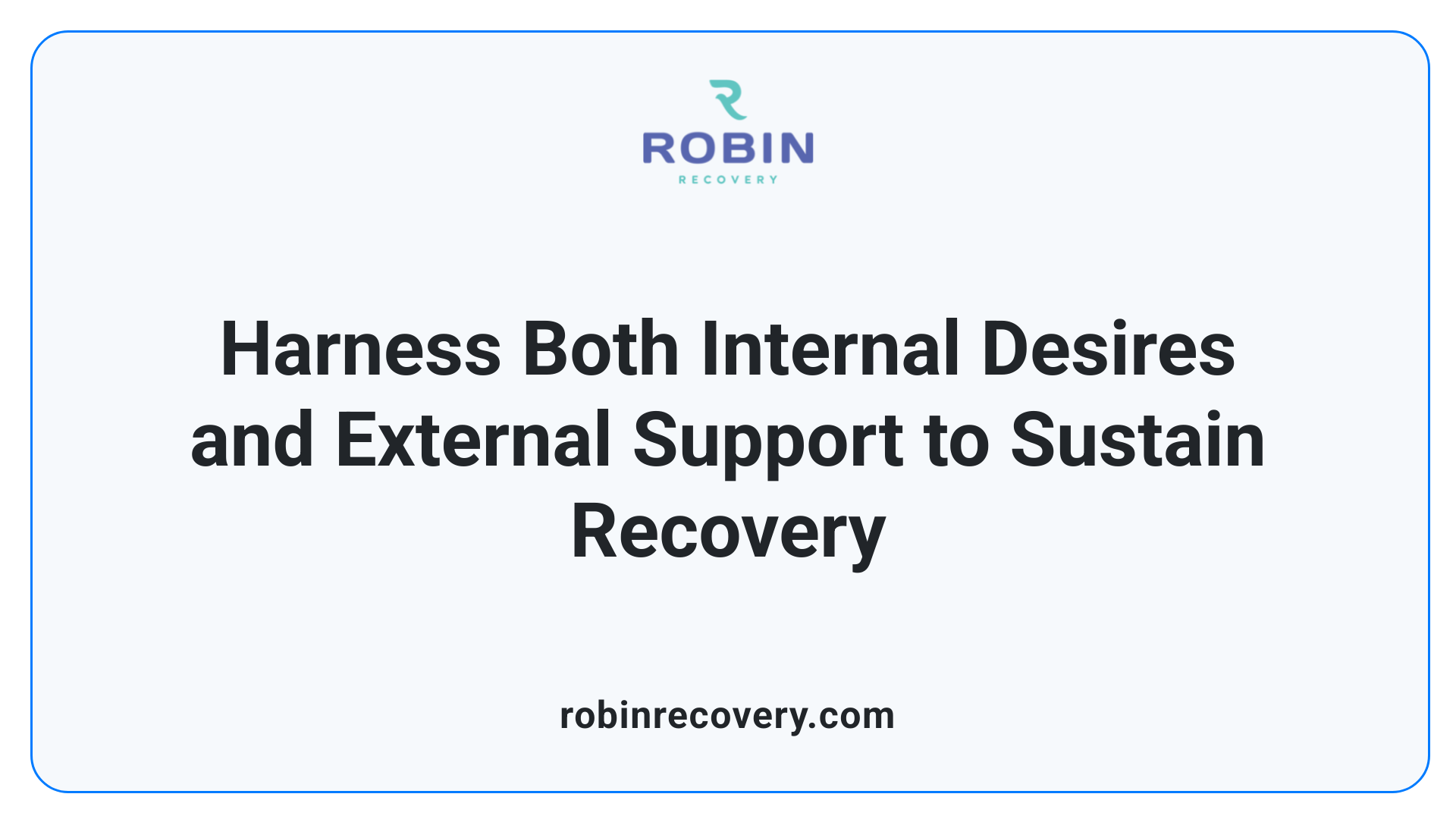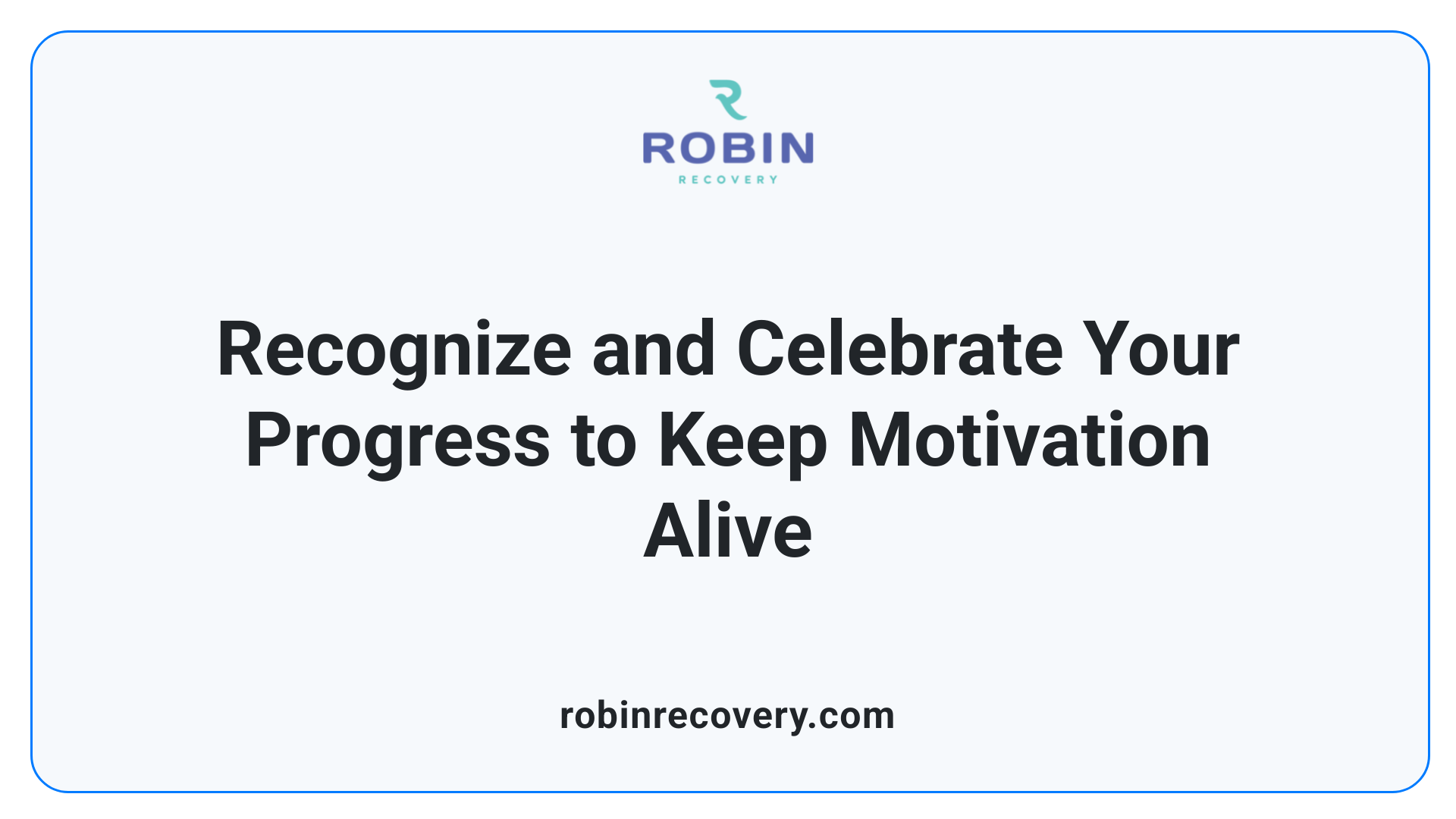How to Stay Motivated in Long-Term Recovery

Understanding Motivation in Recovery
Motivation is the vital force that empowers individuals to embark on and sustain the challenging journey of addiction recovery. Recognizing how motivation works, its initial spark, and how it can wax and wane over time is crucial for maintaining commitment in long-term sobriety. This article explores effective strategies, psychological insights, and support mechanisms essential for staying motivated after the early stages of recovery, ensuring resilience through setbacks and ongoing challenges.
The Foundations of Motivation in Addiction Recovery

What is the role of self-motivation in addiction recovery?
Self-motivation is fundamental in the journey to overcome addiction. It acts as the internal engine that propels individuals to initiate change and persevere through difficult times. This internal drive helps them confront withdrawal symptoms, resist cravings, and navigate setbacks with resilience.
A strong sense of self-efficacy or belief in one's ability to succeed significantly boosts motivation. When individuals recognize their capacity to recover, they are more likely to stay committed to their goals. Counseling strategies like motivational interviewing and understanding the stages of change can bolster this internal motivation by aligning recovery efforts with personal values and fostering a sense of autonomy.
Ultimately, the role of self-motivation extends beyond initial efforts. It sustains long-term sobriety, empowers individuals to take responsibility for their recovery, and reinforces their perseverance to maintain a substance-free life.
How can individuals sustain motivation during long-term addiction recovery?
Sustaining motivation over extended periods can be challenging, but several practical approaches can help. Setting realistic and clear goals provides direction and a sense of purpose. Tracking progress with journals or apps helps visualize achievements, reinforcing a sense of growth.
Support networks, including professionals, support groups like AA or NA, and sober communities, offer encouragement and accountability. Engaging with these groups not only provides motivational boosts but also fosters a sense of belonging.
Learning from setbacks rather than viewing them as failures is crucial. Embracing challenges as opportunities for growth helps rebuild resilience. Incorporating evidence-based treatments, such as therapy or vocational training, can also boost self-esteem and mental well-being.
Resources like the SAMHSA National Helpline are valuable for connecting individuals to local support and treatment options, reinforcing their ongoing recovery commitment.
What are effective strategies and techniques for maintaining motivation in recovery?
Maintaining motivation requires intentional effort and effective strategies. Breaking down recovery into small, manageable steps and celebrating each milestone fosters ongoing achievement.
Building a strong support system is vital. Family, friends, and sober communities provide emotional encouragement and accountability, making the journey less isolating.
Focusing on personal reasons for change, such as health improvements, improved relationships, or personal aspirations, enhances intrinsic motivation and deepens commitment.
Creating structured routines that incorporate self-care, physical activity, mindfulness, and healthy habits can reduce emotional triggers and prevent burnout.
Recognizing early signs of waning motivation—such as boredom, irritability, or complacency—allows individuals to intervene promptly. Employing a person-centered approach—empathetic, empowering, and tailored to individual strengths—further supports sustained motivation.
What are the signs of loss of motivation in recovery, and how can they be addressed?
Loss of motivation often manifests as emotional and behavioral changes. Feelings of hopelessness, frustration, impatience, and anger are common signals. Romanticizing past substance use or feeling overwhelmed can also indicate decline.
Behavioral signs include neglecting support systems, making unhealthy choices, or drifting away from recovery routines.
Addressing these signs requires a proactive approach. Reassessing and adjusting goals to make them more achievable can rekindle motivation. Seeking social or professional support provides encouragement, while practicing self-compassion helps combat negative self-talk.
Celebrating small victories and sticking to structured routines reinforce progress and boost morale. Reflection on personal reasons for recovery—whether health, family, or personal growth—can reignite the inner drive.
Early recognition of these signs allows for timely intervention, which is crucial to prevent relapse and sustain commitment.
What practical advice or tips can help individuals stay inspired throughout their recovery process?
Staying inspired is a vital part of long-term recovery. Breaking large goals into manageable tasks prevents feeling overwhelmed and encourages a steady sense of accomplishment.
Surrounding oneself with supportive, understanding people creates a positive environment vital for motivation.
Engaging in activities that bring joy—like hobbies, exercise, or creative pursuits—enhances mental health and provides natural boosts in motivation.
Maintaining a gratitude journal or regularly acknowledging positive aspects of life fosters a grateful mindset, which can uplift spirits during challenging times.
Practicing mindfulness and meditative techniques helps manage stress and cravings, keeping focus on the present moment.
Seeking professional guidance through therapy or mental health services provides tailored strategies and ongoing encouragement.
Sharing successes and setbacks openly with trusted individuals or groups can reinforce progress and normalize challenges.
In conclusion, motivation is a dynamic, vital component of addiction recovery. It stems from internal desires, reinforced by external supports, and can be cultivated through intentional strategies. Recognizing signs of waning motivation and proactively addressing them with supportive measures—such as goal adjustment, celebrating progress, and self-care—helps sustain long-term recovery efforts. Building a resilient mindset, grounded in personal values and surrounded by a network of encouragement, empowers individuals to navigate the complex path of addiction recovery successfully.
Developing a Resilient Mindset and Self-Care Habits

What are some common signs of loss of motivation, and how can they be effectively managed?
Loss of motivation can manifest through various emotional and physical signs. Individuals may feel apathetic, display a lack of energy or effort, withdraw from social and recovery activities, and experience irritability. Physical symptoms like headaches and poor sleep are also common. Difficulty concentrating, reduced response to rewards, and a sense of aimlessness further indicate waning motivation.
Managing these signs involves first recognizing their presence and underlying causes, such as depression or exhaustion. Consulting healthcare professionals can help address issues like burnout or nutritional gaps. Establishing clear, attainable goals and breaking tasks into smaller steps can reignite momentum. Creating supportive routines, practicing mindfulness, and reconnecting with personal values serve as motivators. Engaging social support, prioritizing good sleep, and maintaining a healthy diet also boost energy levels and emotional resilience, helping to restore motivation.
How can structure and environment support long-term motivation?
A well-organized environment and consistent routines are essential for sustaining recovery motivation. An uplifting, clutter-free space creates a positive atmosphere conducive to healing. Structuring daily activities, including exercise, self-care, and mindful practices, provides stability and reduces chaos.
Having clear boundaries helps prevent overwhelm, enabling focus on recovery goals. A predictable routine builds a sense of normalcy and accomplishment, reinforcing progress. When individuals feel supported by their environment—physically and emotionally—they are better equipped to face challenges, stay engaged, and celebrate small successes. This stability fosters resilience, making long-term motivation more attainable.
What role does gratitude and mindfulness play in sustaining motivation?
Practicing gratitude and mindfulness significantly enhances motivation by cultivating emotional strength and focus. Keeping a gratitude list or regularly expressing thanks shifts attention from problems to positive aspects of life, fostering resilience and hope.
Mindfulness techniques, like deep breathing and meditation, help manage cravings, reduce anxiety, and regulate emotions. These practices increase present-moment awareness, encouraging acceptance and patience throughout recovery. By integrating gratitude and mindfulness into daily routines, individuals develop a compassionate attitude toward themselves, which sustains motivation even during setbacks.
Together, these habits help reinforce reasons for sobriety, promote emotional stability, and empower individuals to persevere on their recovery journey.
The Interplay of Internal and External Motivators

What is the role of self-motivation in addiction recovery?
Self-motivation is essential for overcoming the many hurdles faced during recovery. It drives individuals to initiate behavioral changes like reducing substance use and sticking with therapeutic routines. This internal drive helps manage cravings, setbacks, and withdrawal symptoms, fostering resilience in the face of difficulties. Self-efficacy, or belief in one's ability to recover, is closely linked to self-motivation, empowering individuals to persevere.
By using counseling strategies such as motivational interviewing and models based on stages of change, professionals can help individuals connect their recovery journey to personal values and goals. This personalized approach strengthens self-motivation, making it a cornerstone of lasting sobriety. The stronger the internal desire, the more likely someone is to maintain their efforts over the long term.
How do internal and external motivators differ, and how do they influence recovery?
Internal motivators originate from within the individual. They include personal values, dreams, and aspirations that inspire change. Because these motivators align with a person's identity, they tend to be more sustainable over time. For instance, a person might be motivated by the desire to be a better parent or to enjoy good health.
External motivators involve outside influences such as praise, rewards, or avoiding negative consequences. Examples include family support, success stories from others, or legal pressures. While external motivators can initiate behavior change and promote short-term abstinence, they often lack the depth to sustain long-term recovery.
A balanced approach combines both. External incentives can motivate initial engagement, but internal motivation ensures continued commitment. Cultivating personal reasons for recovery—like aligning sobriety with one's core values—deepens motivation and fosters sustained change.
What strategies can enhance both internal and external motivation?
To strengthen internal motivation, individuals should reflect on their personal reasons for change, set meaningful goals, and visualize successful recovery outcomes. Small, achievable steps help build confidence and reinforce the internal desire to succeed.
Externally, cheerleading from support groups, family, or counselors provides validation and accountability. Celebrating milestones and receiving positive reinforcement bolster external motivation.
Combining these strategies creates a robust support system. Regularly revisiting personal reasons for sobriety, practicing gratitude, and engaging in self-affirming activities deepen internal motivation. Simultaneously, social support and milestone celebrations sustain external motivation.
Integrating internal and external motivators provides a comprehensive approach, increasing the likelihood of enduring recovery success. The key lies in aligning external encouragement with authentic personal reasons, leading to a resilient and motivated recovery journey.
Celebrating Successes and Building a Supportive Environment

What are some common signs of loss of motivation, and how can they be effectively managed?
Loss of motivation during recovery can present in various ways. People might notice feelings of apathy, a lack of energy, or withdrawal from activities they once enjoyed. Irritability, physical symptoms such as headaches or sleep disturbances, and difficulty concentrating can also signal waning motivation. Recognizing these signs is the first step toward addressing them.
To manage these issues effectively, it’s essential to identify underlying causes like depression, burnout, or nutritional deficiencies. Consulting healthcare professionals can provide tailored support. Additionally, setting specific, manageable goals and maintaining a routine can help re-establish a sense of purpose. Practices such as engaging with social support, practicing mindfulness, and making healthy lifestyle choices like regular exercise and balanced nutrition are vital.
Reconnecting with personal values—such as family, health, or personal development—can serve as a powerful reminder of why one embarked on treatment. Addressing emotional and physical health holistically supports renewed motivation and resilience.
How can building a support system aid motivation and recovery?
A strong support network acts as a vital pillar throughout the recovery journey. Friends, family, peers in support groups such as AA or NA, and healthcare providers all contribute to fostering an environment of encouragement and accountability.
Regular interactions within this network help individuals share successes, seek advice during setbacks, and stay committed to their goals. Social connections provide a sense of belonging, which counters feelings of isolation that often diminish motivation.
Participating in community activities or engaging in service work within support groups can bolster self-esteem and reinforce the importance of recovery. Celebrating milestones with others not only motivates but also makes the journey more fulfilling. Overall, a robust support system sustains emotional strength and boosts perseverance.
What role does environment play in sustaining motivation for long-term recovery?
The environment significantly influences motivation, particularly in creating a safe and hopeful space for growth. An organized and uplifting environment can reduce stress and promote clarity of purpose.
Maintaining a routine within a positive setting helps reinforce healthy habits like exercise, mindfulness, and self-care—all crucial to recovery. Moreover, environments free of triggers—such as certain locations, substances, or negative influences—help prevent setbacks.
Having access to supportive relationships and resources encourages resilience. An environment that nurtures emotional safety and provides opportunities for positive interactions empowers individuals to face challenges confidently, celebrate successes, and reaffirm their commitment to recovery.
How does celebrating milestones influence ongoing motivation?
Celebrating milestones, both big and small, plays a vital role in sustaining motivation. Recognition of progress—whether it's a day free from substance use or achieving a health goal—reinforces positive behaviors and bolsters confidence.
These celebrations serve as reflective moments, allowing individuals to acknowledge their efforts and feel grateful for their achievements. Visualizing progress through milestones helps maintain focus on the benefits of sobriety and encourages persistence despite obstacles.
Regular acknowledgment of achievements creates a cycle of positive reinforcement, encouraging ongoing effort and resilience. By celebrating successes, individuals strengthen their intrinsic motivation, inspiring continued commitment and a hopeful outlook throughout their recovery journey.
Sustaining Your Motivational Momentum
Long-term recovery from addiction is a dynamic journey that requires ongoing motivation, resilience, and support. Recognizing the signs of waning drive and proactively applying tailored strategies—such as celebrating small victories, engaging in self-care, cultivating a supportive environment, and connecting with personal values—are fundamental to maintaining motivation. Combining internal sources of inspiration, like purpose and personal growth, with external encouragement from community and professional resources creates a comprehensive approach. Remember, motivation is a skill that can be cultivated and renewed, empowering you to navigate setbacks and celebrate successes on your path to sustained sobriety.
References
- Staying Motivated in Recovery - JourneyPure At The River
- Tips for Staying Motivated in Addiction Recovery
- Addiction Recovery Motivation
- 10 Ways to Stay Motivated During the Recovery Process
- How to Stay Motivated During the Recovery Process
- Self-Motivation: Why it Makes a Difference in Recovery and Life
- 11 Tips for Staying Motivated in Recovery - Stepworks
